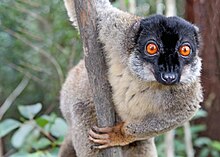Common brown lemur
| Brown Lemur | |
|---|---|
 |
|
| Scientific classification | |
| Kingdom: | Animalia |
| Phylum: | Chordata |
| Class: | Mammalia |
| Order: | Primates |
| Suborder: | Strepsirrhini |
| Family: | Lemuridae |
| Genus: | Eulemur |
| Species: | E. fulvus |
| Binomial name | |
|
Eulemur fulvus É. Geoffroy, 1796 |
|
 |
|
| Distribution of E. fulvus: red = native, green = introduced | |
| Synonyms | |
|
|
The Brown Lemur (Eulemur fulvus), is a species of lemur in the family Lemuridae. It is found in Madagascar and Mayotte.
The common brown lemur lives in western Madagascar north of the Betsiboka River and eastern Madagascar between the Mangoro River and Tsaratanana, as well as in inland Madagascar connecting the eastern and western ranges. They also live on the island of Mayotte, although this population is believed to have been introduced there by man.
The common brown lemur has a total length of 84 to 101 centimeters, including 41 to 51 centimeters of tail. Weight ranges from 2 to 3 kilograms. The short, dense fur is primarily brown or grey-brown. The face, muzzle and crown are dark grey or black with paler eyebrow patches, and the eyes are orange-red.
Similar lemur species within their range include the mongoose lemur, E. mongoz, in the west and the red-bellied lemur, E. rubriventer, in the east. They can be distinguished from these species by the fact that E. mongoz is more of a grey color and E. rubriventer is more reddish. There is also some overlap with the black lemur in northeast Madagascar in the Galoko, Manongarivo and Tsaratanana Massifs. There is also overlap and hybridization with the white-fronted brown lemur, E. albifrons, in the northeast portion of the common brown lemur's range.
The common brown lemur's diet consists primarily of fruits, young leaves, and flowers. In some locations it eats invertebrates, such as cicadas,spiders and millipedes. It also eats bark, sap, soil and red clay (see geophagy). It can tolerate greater levels of toxic compounds from plants than other lemurs can.
...
Wikipedia

